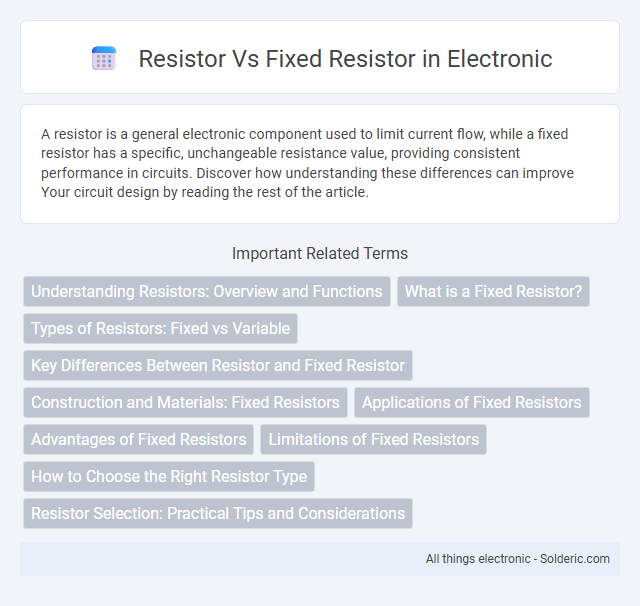A resistor is a general electronic component used to limit current flow, while a fixed resistor has a specific, unchangeable resistance value, providing consistent performance in circuits. Discover how understanding these differences can improve Your circuit design by reading the rest of the article.
Comparison Table
| Feature | Resistor | Fixed Resistor |
|---|---|---|
| Definition | Component that resists electric current. | Resistor with a constant resistance value. |
| Resistance Value | Can be fixed or variable. | Always fixed and non-adjustable. |
| Types | Fixed, variable, and adjustable. | Only fixed types (carbon film, metal film, wirewound). |
| Applications | General current control and signal conditioning. | Consistent resistance for circuits needing stable values. |
| Adjustability | Variable resistors can be adjusted. | No adjustability; fixed resistance. |
| Examples | Potentiometers, rheostats, fixed resistors. | Carbon resistor, metal oxide resistor. |
Understanding Resistors: Overview and Functions
Resistors limit electrical current and adjust signal levels, playing a vital role in circuit functionality and protection. Fixed resistors provide a constant resistance value, ensuring stable performance in applications requiring precise current control. Understanding the distinction between general resistors and fixed resistors helps optimize electronic design by selecting components that meet specific resistance and tolerance requirements.
What is a Fixed Resistor?
A fixed resistor is an electronic component designed to provide a constant resistance value regardless of changes in voltage or current, ensuring reliable control of electrical flow. Unlike variable resistors that allow adjustment, fixed resistors come with a predefined resistance specified in ohms. Your electronic circuits rely on fixed resistors to maintain stable operation by limiting current and dividing voltage precisely.
Types of Resistors: Fixed vs Variable
Fixed resistors maintain a constant resistance value, available in various types such as carbon film, metal oxide, and wire-wound, each suited for specific applications based on power rating, tolerance, and stability. Variable resistors, including potentiometers and rheostats, allow adjustable resistance, enabling fine-tuning in circuits for calibration or control purposes. Understanding the distinct characteristics and use cases of fixed versus variable resistors is crucial for precise electronic design and functionality.
Key Differences Between Resistor and Fixed Resistor
A resistor is a general electronic component used to limit current flow and adjust signal levels, available in various types including fixed and variable resistors. A fixed resistor has a constant resistance value that does not change during operation, providing stable and predictable electrical characteristics. Key differences include the fixed resistor's inability to vary resistance versus other resistor types designed for adjustable functionality in circuits.
Construction and Materials: Fixed Resistors
Fixed resistors are constructed using materials such as carbon film, metal film, or wire wound around an insulating core to provide a stable resistance value. The precise control of resistive material thickness and composition ensures consistent performance in various electronic circuits. Your choice of a fixed resistor depends on factors like power rating, tolerance, and thermal stability for optimal device functionality.
Applications of Fixed Resistors
Fixed resistors are widely used in electronic circuits to limit current, divide voltages, and provide precise resistance values for signal conditioning. They find applications in power supplies, audio equipment, and communication devices where stable resistance is crucial for performance. Common types include carbon film, metal oxide, and wire-wound resistors, each chosen based on power rating and tolerance requirements.
Advantages of Fixed Resistors
Fixed resistors offer precise and stable resistance values, ensuring consistent performance in electronic circuits. Their reliability and low tolerance levels make them ideal for applications requiring accurate current control and voltage division. You benefit from their durability and cost-effectiveness in maintaining circuit integrity over time.
Limitations of Fixed Resistors
Fixed resistors have limitations including a predetermined resistance value that cannot be adjusted, restricting flexibility in circuit design. They may also suffer from tolerance issues, causing slight deviations from their specified resistance, which can affect precision in sensitive applications. Understanding these constraints helps you select the right resistor type for your electronic projects.
How to Choose the Right Resistor Type
Choosing the right resistor type depends on the specific application requirements such as tolerance, power rating, and stability. Fixed resistors offer precise resistance values and are ideal for circuits needing consistent performance without adjustments. Consider environmental factors and the need for adjustability; if flexibility in resistance is needed, a variable resistor may be more suitable than a fixed resistor.
Resistor Selection: Practical Tips and Considerations
Resistor selection involves evaluating factors such as resistance value, tolerance, power rating, and temperature coefficient to ensure optimal circuit performance. Fixed resistors offer consistent resistance with minimal variation, making them ideal for stable and predictable applications where precise resistance is required. Considering the operating environment and electrical specifications helps engineers choose the appropriate resistor type, enhancing reliability and efficiency in electronic designs.
resistor vs fixed resistor Infographic

 solderic.com
solderic.com